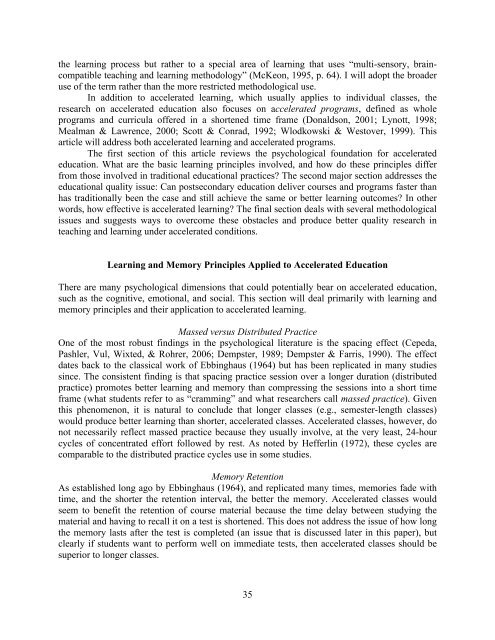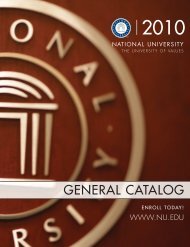Journal of Research in Innovative Teaching - National University
Journal of Research in Innovative Teaching - National University
Journal of Research in Innovative Teaching - National University
Create successful ePaper yourself
Turn your PDF publications into a flip-book with our unique Google optimized e-Paper software.
the learn<strong>in</strong>g process but rather to a special area <strong>of</strong> learn<strong>in</strong>g that uses “multi-sensory, bra<strong>in</strong>compatible<br />
teach<strong>in</strong>g and learn<strong>in</strong>g methodology” (McKeon, 1995, p. 64). I will adopt the broader<br />
use <strong>of</strong> the term rather than the more restricted methodological use.<br />
In addition to accelerated learn<strong>in</strong>g, which usually applies to <strong>in</strong>dividual classes, the<br />
research on accelerated education also focuses on accelerated programs, def<strong>in</strong>ed as whole<br />
programs and curricula <strong>of</strong>fered <strong>in</strong> a shortened time frame (Donaldson, 2001; Lynott, 1998;<br />
Mealman & Lawrence, 2000; Scott & Conrad, 1992; Wlodkowski & Westover, 1999). This<br />
article will address both accelerated learn<strong>in</strong>g and accelerated programs.<br />
The first section <strong>of</strong> this article reviews the psychological foundation for accelerated<br />
education. What are the basic learn<strong>in</strong>g pr<strong>in</strong>ciples <strong>in</strong>volved, and how do these pr<strong>in</strong>ciples differ<br />
from those <strong>in</strong>volved <strong>in</strong> traditional educational practices The second major section addresses the<br />
educational quality issue: Can postsecondary education deliver courses and programs faster than<br />
has traditionally been the case and still achieve the same or better learn<strong>in</strong>g outcomes In other<br />
words, how effective is accelerated learn<strong>in</strong>g The f<strong>in</strong>al section deals with several methodological<br />
issues and suggests ways to overcome these obstacles and produce better quality research <strong>in</strong><br />
teach<strong>in</strong>g and learn<strong>in</strong>g under accelerated conditions.<br />
Learn<strong>in</strong>g and Memory Pr<strong>in</strong>ciples Applied to Accelerated Education<br />
There are many psychological dimensions that could potentially bear on accelerated education,<br />
such as the cognitive, emotional, and social. This section will deal primarily with learn<strong>in</strong>g and<br />
memory pr<strong>in</strong>ciples and their application to accelerated learn<strong>in</strong>g.<br />
Massed versus Distributed Practice<br />
One <strong>of</strong> the most robust f<strong>in</strong>d<strong>in</strong>gs <strong>in</strong> the psychological literature is the spac<strong>in</strong>g effect (Cepeda,<br />
Pashler, Vul, Wixted, & Rohrer, 2006; Dempster, 1989; Dempster & Farris, 1990). The effect<br />
dates back to the classical work <strong>of</strong> Ebb<strong>in</strong>ghaus (1964) but has been replicated <strong>in</strong> many studies<br />
s<strong>in</strong>ce. The consistent f<strong>in</strong>d<strong>in</strong>g is that spac<strong>in</strong>g practice session over a longer duration (distributed<br />
practice) promotes better learn<strong>in</strong>g and memory than compress<strong>in</strong>g the sessions <strong>in</strong>to a short time<br />
frame (what students refer to as “cramm<strong>in</strong>g” and what researchers call massed practice). Given<br />
this phenomenon, it is natural to conclude that longer classes (e.g., semester-length classes)<br />
would produce better learn<strong>in</strong>g than shorter, accelerated classes. Accelerated classes, however, do<br />
not necessarily reflect massed practice because they usually <strong>in</strong>volve, at the very least, 24-hour<br />
cycles <strong>of</strong> concentrated effort followed by rest. As noted by Hefferl<strong>in</strong> (1972), these cycles are<br />
comparable to the distributed practice cycles use <strong>in</strong> some studies.<br />
Memory Retention<br />
As established long ago by Ebb<strong>in</strong>ghaus (1964), and replicated many times, memories fade with<br />
time, and the shorter the retention <strong>in</strong>terval, the better the memory. Accelerated classes would<br />
seem to benefit the retention <strong>of</strong> course material because the time delay between study<strong>in</strong>g the<br />
material and hav<strong>in</strong>g to recall it on a test is shortened. This does not address the issue <strong>of</strong> how long<br />
the memory lasts after the test is completed (an issue that is discussed later <strong>in</strong> this paper), but<br />
clearly if students want to perform well on immediate tests, then accelerated classes should be<br />
superior to longer classes.<br />
35

















